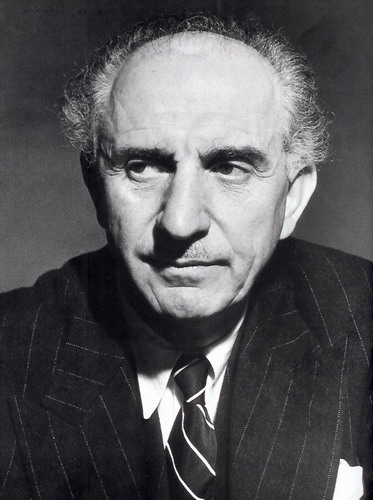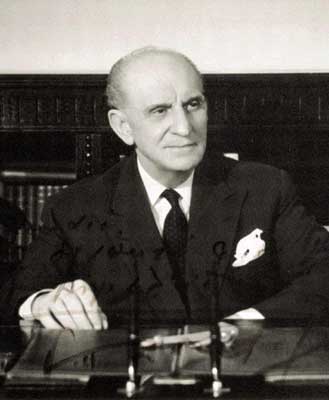<Back to Index>
- Surgeon John Hunter, 1728
- Painter Giovanni Battista Piazzetta, 1682
- Prime Minister of Greece George Papandreou, 1888
PAGE SPONSOR


George Papandreou (Greek: Γεώργιος Παπανδρέου, Geórgios Papandréou) (13 February 1888 - 1 November 1968) was a Greek politician who served three terms as Prime Minister of Greece. He was born at Kalentzi, in Achaea in West Greece. As a young man, he became involved in politics as a supporter of the Liberal leader Eleftherios Venizelos, who made him Governor of Chios after the Balkan War of 1912. He married Sofia Mineyko, a Polish national, and their son Andreas Papandreou was born in Chios in 1919.
During the political crisis surrounding Greece's entry into World War I, Papandreou was one of Venizelos's closest supporters against the pro-German King Constantine I. When Venizelos was forced to flee Athens, Papandreou accompanied him to Crete, and then went to Lesbos, where he mobilised anti-monarchist supporters in the islands and rallied support for Venizelos's insurgent pro-British government in Thessaloniki. In 1921 he narrowly escaped assassination.
Papandreou served as a Venizelist Member of Parliament, as Interior Minister in 1923, and in several other government posts during the Republic of 1924 – 1935. As a Minister of Education, he reformed the Greek school system. In 1935, he set up the Democratic Socialist Party of Greece. A lifelong opponent of the Greek monarchy, he was exiled in 1936 by the Greek royalist dictator Ioannis Metaxas. Following the German occupation of Greece in World War II, he joined the predominantly Venizelist government in exile based in Egypt (with British support, and king George II as official head of state), and in 1944 - 45 he served as Prime Minister. During the later 1940s he saw the Greek Communist Party as the main threat to democracy and served in a number of cabinets between 1946 and 1952 while the Greek Civil War was raging.
Papandreou spent the rest of the 1950s in opposition, while the conservatives were in the ascendance. In 1961 Papandreou revived Greek liberalism by founding the Center Union Party, a confederation of old liberal Venizelists and dissatisfied conservatives. After the elections of "violence and fraud" of 1961, Papandreou declared an "uncompromising fight" against the right-wing ERE. His party won the elections of November 1963 and those of 1964, the second with a landslide majority. His progressive policies as premier aroused much opposition in conservative circles, as did the prominent role played by his son Andreas, whose policies were seen as being considerably left of center.
He opposed the Zürich and London Agreement which led to the foundation of the Republic of Cyprus. Following clashes between the Greek and Turkish communities, his government sent a Greek army division to the island.
King Constantine II openly opposed Papandreou's government and there were frequent ultra-rightist plots in the Army which destabilised the government. Finally the King engineered a split in the Centre Union in July 1965, known as apostasia or Iouliana, and he dismissed the government following a dispute over control of the Ministry of Defence. After the April 1967 military coup by the Colonels' junta led by George Papadopoulos, Papandreou was arrested. He died under house arrest in November 1968. His funeral became the occasion for a large anti-dictatorship demonstration. He is interred at the First Cemetery of Athens, alongside his son Andreas.
Georgios Papandreou was never referred to as "Senior" during his lifetime. During the Junta and after his death he was often referred to affectionately as "ο Γέρος της δημοκρατίας" (o Géros tis dimokratías) — "the old man of democracy". Since his grandson George A. Papandreou entered politics, most Greek writers use Γεώργιος (Geórgios) to refer to the grandfather and the less formal Γιώργος (Giórgos) to refer to the grandson.